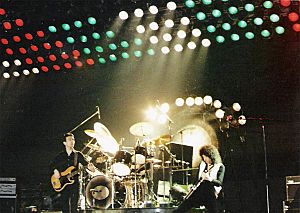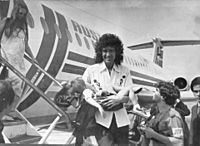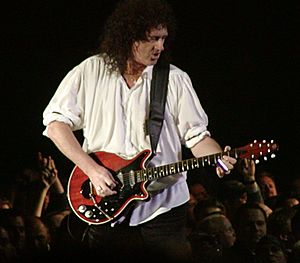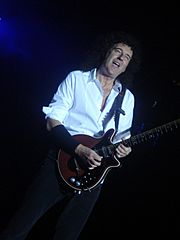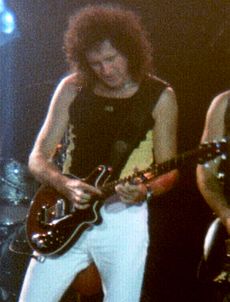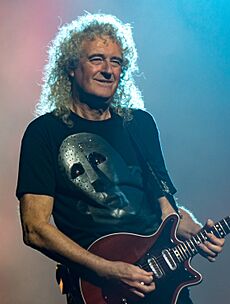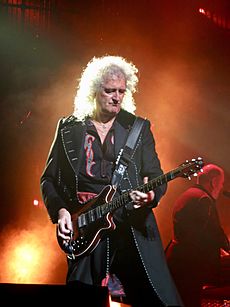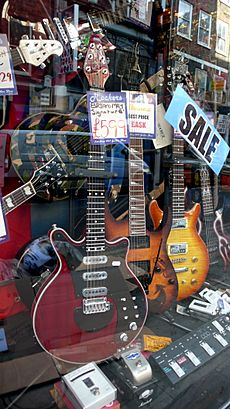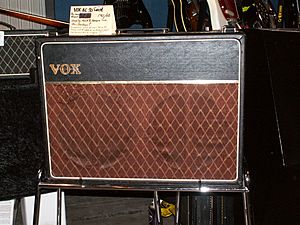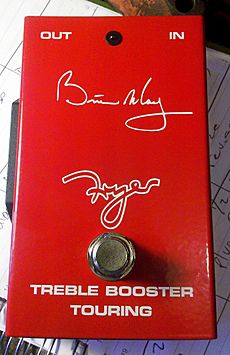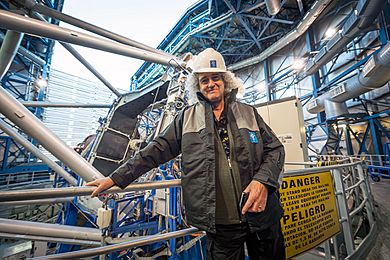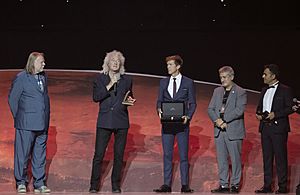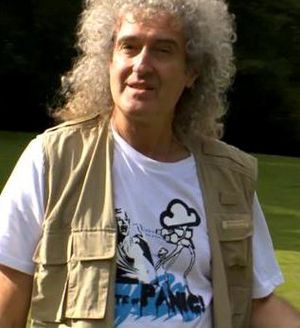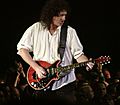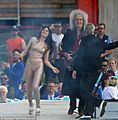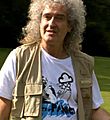Brian May facts for kids
Quick facts for kids
Sir
Brian May
|
|
|---|---|
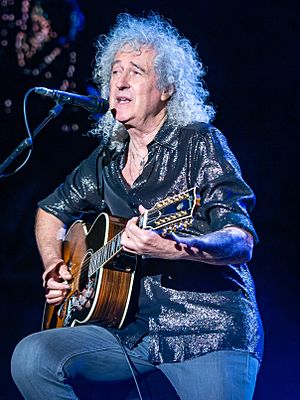
May performing in 2022
|
|
| Born |
Brian Harold May
19 July 1947 Hampton Hill, Middlesex, England
|
| Occupation |
|
| Years active | 1963–present |
| Spouse(s) |
|
| Children | 3 |
| Awards |
|
| Musical career | |
| Genres | |
| Instruments |
|
| Labels | |
| Education | Hampton School |
| Alma mater | Imperial College London (BSc, PhD) |
| Scientific career | |
| Fields | Astrophysics |
| Thesis | A survey of radial velocities in the zodiacal dust cloud (2008) |
| Doctoral advisor |
|
Sir Brian Harold May (born 19 July 1947) is a famous English musician, songwriter, and record producer. He is also an animal welfare activist and an astrophysicist. Brian May is best known as the lead guitarist and backing singer for the rock band Queen. He started the band with singer Freddie Mercury and drummer Roger Taylor. His amazing guitar playing and songwriting helped Queen become one of the most successful bands ever.
Before Queen, May played with Roger Taylor in a progressive rock band called Smile. After Freddie Mercury joined in 1970, and bass guitarist John Deacon completed the group in 1971, they became Queen. They became hugely popular with their album A Night at the Opera and the hit song "Bohemian Rhapsody". From the mid-1970s to 1986, Queen performed at huge venues, including the famous Live Aid concert in 1985.
Brian May is known as a very skilled musician. He created a unique sound using layers of guitar, often with his homemade electric guitar called the Red Special. He wrote many of Queen's biggest hits, including "We Will Rock You", "I Want It All", "Fat Bottomed Girls", "Now I'm Here", "Headlong", "Flash", "Hammer to Fall", "Save Me", "Who Wants to Live Forever" and "The Show Must Go On".
After Freddie Mercury passed away in 1991, Queen took a break. Brian May and Roger Taylor later reunited Queen for performances with other singers. In 2005, a poll by Planet Rock radio named May the seventh-greatest guitarist of all time. Rolling Stone magazine ranked him No. 33 on their 2023 list of the 250 greatest guitarists. In 2012, Guitar World magazine readers voted him the second-greatest guitarist. In 2001, May was inducted into the Rock and Roll Hall of Fame as a member of Queen. In 2018, the band received the Grammy Lifetime Achievement Award.
In 2005, May was honored as a Commander of the Most Excellent Order of the British Empire (CBE) for his contributions to music and charity. He earned a PhD in astrophysics from Imperial College London in 2007. He was also the Chancellor of Liverpool John Moores University from 2008 to 2013. May worked with NASA on the New Horizons mission to Pluto. He also helped start Asteroid Day, a campaign to raise awareness about asteroids. An asteroid, 52665 Brianmay, was named after him. In 2023, May helped with NASA's OSIRIS-REx mission, which successfully collected samples from the asteroid Bennu and brought them to Earth. Brian May is also a strong supporter of animal welfare. He campaigns against fox hunting and the culling of badgers in the UK. In 2023, King Charles III made Brian May a knight for his work in music and charity.
Contents
Early Life and Education
Brian Harold May was born on 19 July 1947 in Hampton Hill, near Twickenham, Middlesex, England. He is the only child of Ruth Irving and Harold May. His father worked as a draughtsman for the Ministry of Aviation.
Brian went to Hanworth Road primary school. At age 11, he won a scholarship to Hampton Grammar School. During this time, he formed his first band, called 1984, named after George Orwell's book Nineteen Eighty-Four. He played with singer and bassist Tim Staffell.
At Hampton Grammar School, May achieved high grades in physics, mathematics, and applied mathematics. He then studied mathematics and physics at Imperial College London. He graduated with a Bachelor of Science (BSc) degree in physics in 1968. He started working on his PhD in astrophysics in 1971 but paused it when Queen became famous. He finished his PhD in 2007.
Musical Journey
Smile: The Early Days
Brian May formed the band Smile in 1968. The group included Tim Staffell as the lead singer and bassist. Later, Roger Taylor, who would also join Queen, became their drummer. Smile was together for two years, from 1968 to 1970. Staffell left in 1970, and the band had nine songs. Smile reunited for a few songs on 22 December 1992.
Queen: Rocking the World
In Queen's songs, Brian May often sang the lower harmony parts. He also sang lead vocals on some of his own songs. These include the first part of "Who Wants to Live Forever" and the last part of "Mother Love". He also sang lead on "Some Day One Day", "She Makes Me (Stormtrooper in Stilettoes)", "'39", "Good Company", "Long Away", "All Dead, All Dead", "Sleeping on the Sidewalk", "Leaving Home Ain't Easy" and "Sail Away Sweet Sister".
May wrote many famous songs for Queen. Some of these are "We Will Rock You", "Tie Your Mother Down", "I Want It All", "Fat Bottomed Girls", "Who Wants to Live Forever" and "The Show Must Go On". He also wrote "Hammer to Fall", "Flash", "Now I'm Here", "Brighton Rock", "The Prophet's Song", "Las Palabras de Amor", "No-One but You (Only the Good Die Young)" and "Save Me".
After the Live Aid concert in 1985, Freddie Mercury suggested they write a song together. This led to "One Vision", which May mostly wrote the music for. The lyrics were a team effort by all four band members.
For their 1989 album, The Miracle, Queen decided to credit all songs to the whole band. May wrote "I Want It All" and "Scandal" for this album. He also helped create parts of other songs like "Party" and "Was It All Worth It".
Queen's next album was Innuendo. May contributed more to this album, especially with arrangements. He helped arrange the guitar solo on the title track. He also added vocals to "I'm Going Slightly Mad" and wrote the solo for "These Are the Days of Our Lives".
Two songs May wrote for his solo album, "Headlong" and "I Can't Live With You", ended up on the Queen album. His other song was "The Show Must Go On", which he was the main composer for. In recent years, he has overseen the re-release of Queen albums and DVDs.
In 2004, May announced that he and Roger Taylor would tour as "Queen" with Free/Bad Company singer Paul Rodgers. This group, called "Queen + Paul Rodgers", toured in 2005 and 2006. They released a new album in 2008 called The Cosmos Rocks. Paul Rodgers left the band in May 2009.
In 2011, another singer, Adam Lambert, joined them. Queen + Adam Lambert toured Europe in 2012 and the world in 2014 and 2015. They also played a New Year's concert at Big Ben in 2014.
Solo Work and Collaborations
During 1983, Brian May worked on other projects. He recorded a mini-album called Star Fleet Project with Eddie Van Halen. In 1986, May played guitar on former Genesis guitarist Steve Hackett's album Feedback 86. He also worked with actress Anita Dobson on her first album. May and Dobson later married in 2000.
After Freddie Mercury's passing in 1991, May focused on his solo album, Back to the Light. This album included the song "Too Much Love Will Kill You". A version with Freddie Mercury's vocals was later released on the Queen album Made in Heaven.
In late 1992, the Brian May Band was formed. They toured the world in 1993. After the tour, May returned to the studio with Roger Taylor and John Deacon to finish Made in Heaven, Queen's final studio album. They used Freddie Mercury's demo recordings and added their own parts.
In 1995, May started working on a new solo album, Another World. This album featured musicians like Spike Edney, Cozy Powell, Neil Murray, and Jamie Moses. Sadly, Cozy Powell passed away in a car accident in 1998. Eric Singer later joined the band for the 1998 world tour.
In May 1999, May recorded guitar for the Guns N' Roses song "Catcher in the Rye". However, his part was removed from the album when it was released in 2008.
Since 1998, May has performed as a solo artist and with Queen. In 2002, he performed a guitar solo of "God Save the Queen" from the roof of Buckingham Palace for the Golden Jubilee of Elizabeth II celebrations. In 2004, May played guitar on the song "Someone to Die For" for the Spider-Man 2 soundtrack.
In 2009, May and Roger Taylor performed "We Are the Champions" on American Idol with winner Kris Allen and runner-up Adam Lambert. In November 2009, May appeared on The X Factor with Queen, performing "Bohemian Rhapsody".
May has worked closely with singer Kerry Ellis. He produced her album Anthems (2010) and performed with her many times. In 2011, May toured with Kerry Ellis across the UK.
On 18 April 2011, Lady Gaga confirmed that May played guitar on her song "You and I" from her album Born This Way. May joined Gaga on stage to perform the song at the 2011 MTV Video Music Awards. May also performed with My Chemical Romance at the Reading Festival in 2011.
At the 2011 MTV Europe Music Awards on 6 November, Queen received the Global Icon Award. Queen closed the ceremony with Adam Lambert singing, performing "The Show Must Go On", "We Will Rock You" and "We Are the Champions".
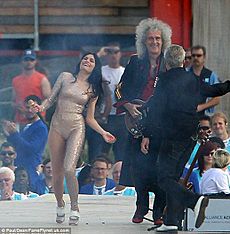
Queen + Adam Lambert played two sold-out shows in London in July 2012. They also performed in Kyiv, Ukraine, with Elton John for a charity concert. They played in Moscow and Wroclaw, Poland, too.
In January 2012, May played guitar on N-Dubz frontman Dappy's solo song "Rockstar". Queen performed at the closing ceremony of the 2012 Summer Olympics in London on 12 August 2012. May played part of the "Brighton Rock" solo. He was then joined by Roger Taylor and Jessie J for "We Will Rock You".
In 2015, May played guitar on the song "One Voice" from the film A Dog Named Gucci. This song featured other artists like Norah Jones and Neko Case. Profits from the song went to animal charities. In 2018, Welsh musician Jayce Lewis worked with May on the song We Are One.
On 29 March 2019, May inducted Def Leppard into the Rock and Roll Hall of Fame. He also worked with Five Finger Death Punch and Kenny Wayne Shepherd to re-record "Blue on Black" in support of The Gary Sinise Foundation. In 2024, May played guitar on a re-release of Mark Knopfler's "Going Home: Theme of the Local Hero" for the Teenage Cancer Trust.
Queen + Adam Lambert: A New Era
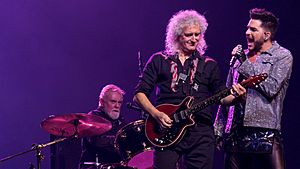
After performing with Adam Lambert on American Idol in 2009, May and Taylor considered Queen's future. At the 2011 MTV Europe Music Awards, Queen received the Global Icon Award. They performed with Adam Lambert, and the audience loved it. This led to a short European tour in 2012.
The collaboration continued in 2013 with a performance at the iHeartRadio Music Festival in Las Vegas. In 2014, May, Taylor, and Lambert announced a North American tour. Due to high demand, more dates were added. They also toured Australia, New Zealand, South Korea, and Japan. The tour extended to the UK and Europe in 2015. The group performed in South America in September 2015, including Queen's first performance at the Rock in Rio Festival since 1985.
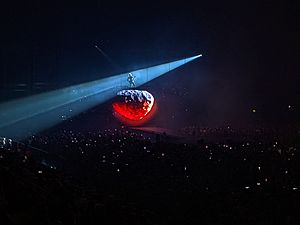
In 2016, the group toured Europe and Asia. They closed the Isle of Wight Festival in England on 12 June. They performed "Who Wants to Live Forever" as a tribute to victims of a shooting in Orlando, Florida. On 12 September, they played in Tel Aviv, Israel, for the first time to 58,000 people. In September 2018, the group had a series of shows in Las Vegas. While they continue to perform, there are no current plans for a studio album.
On 4 June 2022, Queen + Adam Lambert opened the Platinum Party at the Palace outside Buckingham Palace. This event celebrated the Platinum Jubilee of Elizabeth II. May appeared in front of the Victoria Memorial monument. They opened with "We Will Rock You", which was introduced by a funny segment where the Queen and Paddington Bear tapped their tea cups to the song's beat.
Music Style and Equipment
Guitar Playing
Many people consider Brian May a very skilled guitarist. He has been featured in many polls of the greatest rock guitarists. In 2011, Rolling Stone magazine ranked him number 26 on their list of the "100 Greatest Guitarists of All Time". In 2007, readers of Guitar World voted his solos on "Bohemian Rhapsody" and "Brighton Rock" into the "top 50 Greatest Guitar Solos of all time".
Sammy Hagar, former singer of Van Halen, said Brian May has "one of the great guitar tones on the planet". Justin Hawkins, lead guitarist of the Darkness, said May was his earliest influence. He loved May's tone and how his playing sounded like a singing voice.
American guitar player Steve Vai praised May's unique style. He said May's solos are like melodies and fit perfectly into Queen's music.
Most of May's electric guitar work is done on the Red Special. He built this guitar with his father when he was sixteen. It was made from wood from an old fireplace and household items like mother-of-pearl buttons and motorbike valve springs. May prefers to use coins, especially a sixpence, instead of a plastic plectrum. He feels the coin's stiffness gives him more control.
May is known for his detailed arrangements, often creating multi-part harmonies with his guitar. Examples can be heard in Queen's albums A Night at the Opera and A Day at the Races. He explored many guitar styles, including sweep picking, tremolo, and tapping. Some of his solos were even composed by Freddie Mercury, who then asked May to play them. May also played acoustic guitar on songs like "White Queen" and "Love of My Life".
With the Red Special, May could create unique sound effects. He imitated an orchestra in "Procession" and a Dixieland jazz band in "Good Company". Queen's early albums often stated, "No synthesizers were used on this album," to show these sounds came from May's guitar.
Influences on May
Brian May's early influences included Cliff Richard and the Shadows. He later had the chance to play with the Shadows' lead guitarist Hank Marvin. May has always said that the Beatles, Led Zeppelin, the Who and Jimi Hendrix were his biggest influences. He also mentioned Jeff Beck and Eric Clapton as guitar heroes. May told Guitarist in 2004 that Jimmy Page (from Led Zeppelin) was "one of the great brains of rock music".
May also credits Rory Gallagher as a major influence. He said, "it was Rory that gave me my sound, and that's the sound I still have." May was also influenced by Steve Hackett, guitarist of the progressive rock band Genesis.
Musical Gear
Guitars
Since 1975, May has had several replicas of his Red Special guitar made. Some were used for live shows and recordings, while others were spares. The most famous replicas were made by John Birch, Greco, Guild, Fryers, and Guyton. May usually carries at least one backup guitar during live performances. He sometimes uses other guitars for specific songs or tunings. Today, May owns a company that makes guitars based on his original Red Special.
He currently uses a Gibson 12-string SJ200. Some other electric guitars he used in the studio include:
- Burns Double Six on "Long Away" (1976) and "Under Pressure" (1981).
- Fender Telecaster on "Crazy Little Thing Called Love" (1979).
- Gibson Firebird on "Hammer to Fall" and "Tear It Up" (album versions).
- Ibanez JS on "Nothing But Blue" (1991).
- Parker Fly on "Mother Love" (1993–1995).
For acoustic guitars, he preferred Ovation, Martin, Tōkai Hummingbird, Godin, and Guild.
Amplifiers and Effects
May has almost always used Vox AC30 amplifiers since meeting Rory Gallagher in the late 1960s. He often uses six of them, along with an Echoplex delay. He also uses a homemade booster, which is his only effects pedal and is always on. He uses the AC30TBX model, which has a top-boost feature and Blue Alnico speakers. He runs the amp at full volume on the Normal channel.
May also customizes his amps by removing certain channels, which slightly changes the tone. He always uses a treble booster. This, along with the AC30 and his custom 'Deacy Amp' (built by Queen bassist John Deacon), helped create his unique guitar sounds. He used the Dallas Rangemaster for Queen's first albums. Later, effects designer Pete Cornish built him the TB-83 booster.
When playing live, May uses many Vox AC30 amplifiers. Some amps are for just guitar, and others have effects like delay, flanger, and chorus. He has a special switch unit on his pedal board that lets him choose which amps are active. He uses a BOSS Chorus Ensemble CE-1 pedal and a Foxx Foot Phaser. He also uses two delay machines for his famous solo in "Brighton Rock".
Other Instruments and Vocals
As a child, May learned to play classical piano. While Freddie Mercury was Queen's main pianist, May sometimes played piano on songs like "Save Me" and "Flash". He mostly used Freddie Mercury's 1972 Steinway piano. From 1979 onwards, he also played synthesisers, organ, and programmed drum machines.
The first instrument May learned was the banjolele. He used a "genuine George Formby Ukulele-Banjo" in "Bring Back That Leroy Brown" and "Good Company". May also recorded on other string instruments like harp and bass. He even used toy instruments, like a Yamaha plastic piano in "Teo Torriatte" and a toy mini koto in "The Prophet's Song".
May is also a talented singer. From Queen's Queen II to The Game, he sang lead vocals on at least one song per album.
Scientific Pursuits
Brian May studied physics and mathematics at Imperial College London. He earned a BSc (Hons) degree in physics. From 1970 to 1974, he worked on his PhD in astrophysics. His research focused on light reflected from interplanetary dust and the speed of dust in the Solar System. When Queen became famous, he stopped his studies. However, he still co-authored two research papers based on his observations at the Teide Observatory in Tenerife.
In October 2006, May returned to his PhD studies at Imperial College. He submitted his thesis in August 2007, about 37 years after he started it. His thesis was titled "A Survey of Radial Velocities in the Zodiacal Dust Cloud". He graduated at Imperial College on 14 May 2008.
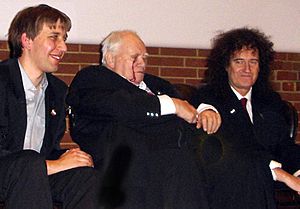
In October 2007, May became a visiting researcher at Imperial College. He continues his interest in astronomy and works with the Imperial Astrophysics Group. He co-authored books like Bang! – The Complete History of the Universe and The Cosmic Tourist with Sir Patrick Moore and Chris Lintott. May also appeared on the 700th episode of The Sky at Night.
On 17 November 2007, May was appointed chancellor of Liverpool John Moores University. He held this position until 2013. The asteroid 52665 Brianmay was named after him in 2008.
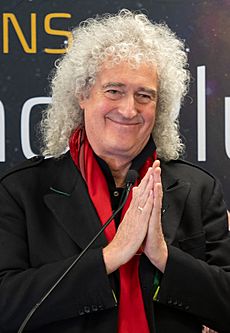
In 2014, May co-founded Asteroid Day with astronaut Rusty Schweickart and filmmaker Grigorij Richters. Asteroid Day is a global campaign to teach people about asteroids and how to protect our planet.
May was a science team collaborator for NASA's New Horizons mission to Pluto. He attended the press conference in July 2015. From December 2018 to January 2019, May was at the watch party for the New Horizons flyby of the Kuiper belt object, 486958 Arrokoth. He performed an updated version of his "New Horizons" song. May also worked on the first stereoanaglyph (3D image) of Arrokoth from the spacecraft's images.
In 2019, he received the Lawrence J. Burpee Medal for his contributions to geography. In 2020, he helped create 3D images for a scientific paper about the formation of asteroids (101955) Bennu and (162173) Ryugu. He received the JAXA Hayabusa2 Honor Award for his work on Ryugu's 3D images.
In 2021, he contributed 3D images for a paper on the asteroid (65803) Didymos. He is also on the advisory board for the NEO-MAPP project, which focuses on Near-Earth-Objects. In 2022, May received a Doctorate of Science honoris causa from the University of Hull. In September 2022, he was awarded the Stephen Hawking Medal for Science Communication at the Starmus IV festival in Armenia.
In December 2022, May was made a Knight Bachelor by King Charles III. He was officially knighted in March 2023.
Personal Life
Brian May was married to Christine Mullen from 1976 to 1988, and they had three children. They separated in 1988. May met actress Anita Dobson in 1986. She inspired his 1989 hit song "I Want It All". They married on 18 November 2000.
May has spoken about experiencing depression in the late 1980s and early 1990s. This was due to his first marriage ending, and the deaths of Freddie Mercury and his father.
According to The Sunday Times Rich List of 2019, May is worth £160 million. He has homes in London and Windlesham, Surrey. May's father was a heavy smoker, and because of this, May dislikes smoking. He even banned smoking at his concerts before many countries had smoking bans.
May became a vegan in 2020. He believes eating meat contributed to the COVID-19 pandemic. May describes himself as spiritual but not part of an organized religion.
May is a strong supporter of woodlands for wildlife. In 2012, he bought land in Bere Regis, Dorset, to protect it from building. In 2013, he started a project to create a woodland area called May's Wood, planting 100,000 trees.
In 2013, a new species of damselfly from Brazil was named Heteragrion brianmayi. This was one of four damselflies named after Queen band members to celebrate the band's 40th anniversary.
In May 2020, May had a small heart attack and needed three stents. He said he was "very near death". In September 2024, he shared that he had a minor stroke, which temporarily affected his left arm. However, he said he could still play guitar.
Activism for Animals
In 2010, May started an animal welfare organization called Save Me. It works to protect wild animals, especially by preventing fox hunting and the culling of badgers. May believes there is no clear proof that badgers spread bovine TB to cows. He also thinks culling badgers is not helpful. The group wants to keep laws that protect animals, like the Hunting Act 2004.
In a 2010 interview, May said he would rather be remembered for his animal welfare work than for his music or science. May supports the International Fund for Animal Welfare, the League Against Cruel Sports, PETA UK, and the Harper Asprey Wildlife Rescue.
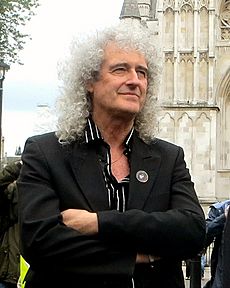
In May 2013, May joined actor Brian Blessed and cartoonist Jonti "Weebl" Picking to form Team Badger. This group fights against plans to cull badgers. With Weebl and Blessed, May recorded a song called "Save the Badger Badger Badger". This song combined Weebl's "Badger Badger Badger" cartoon with Queen's "Flash". In September 2013, the song reached No. 1 on the iTunes Rock chart. In June 2013, David Attenborough and Slash also joined May to release a song for badgers called "Badger Swagger".
May is a former vice-president of the RSPCA. In September 2024, he resigned from this role after concerns about animal welfare at RSPCA Assured farms.
Stereophotography
May has always loved collecting Victorian stereophotography. In 2009, he published a book called A Village Lost and Found with Elena Vidal. This book was about the work of English stereophotography inventor T. R. Williams. In 2012, he received the Royal Photographic Society's Saxby Medal for his work in 3D imaging.
May also contributed to a book for an exhibition of 3D photographs of Pablo Picasso. His 3D Owl viewer is used to see the photos in 3D.
In 1973, May started collecting Les Diableries, which are 3D photographs showing scenes of daily life in Hell. On 10 October 2013, the book Diableries: Stereoscopic Adventures in ... by Brian May, Denis Pellerin, and Paula Fleming was published.
In 2017, May published Queen in 3-D. This book tells the band's 50-year history using over 300 of his own 3D photos. It is the first book about Queen written by one of its members. The book includes May's patented OWL Stereoscopic Viewer.
In 2021, May and Denis Pellerin received honorary degrees from Royal Holloway College, University of London. This recognized their work to preserve Victorian stereoscopy through the London Stereoscopic Company.
Portrayal in Film
In the 2018 movie Bohemian Rhapsody, which tells the story of Queen, Brian May was played by Gwilym Lee. May himself was a creative and musical consultant for the film. He worked very closely with Lee.
Discography
With Queen
- Queen (1973)
- Queen II (1974)
- Sheer Heart Attack (1974)
- A Night at the Opera (1975)
- A Day at the Races (1976)
- News of the World (1977)
- Jazz (1978)
- The Game (1980)
- Flash Gordon (1980)
- Hot Space (1982)
- The Works (1984)
- A Kind of Magic (1986)
- The Miracle (1989)
- Innuendo (1991)
- Made in Heaven (1995)
- The Cosmos Rocks (as Queen + Paul Rodgers) (2008)
Solo discography
- Back to the Light (1992)
- Another World (1998)
- Furia (2000) soundtrack
Collaborations
- Star Fleet Project (with Eddie Van Halen) (1983)
- El Vampiro Bajo el Sol (with Paralamas do Sucesso and Fito Paez) (1994)
- Feedback 86 (with Steve Hackett) (2000) Recorded in 1986 and released in 2000.
- Anthems (with Kerry Ellis) (2010)
- Acoustic by Candlelight (with Kerry Ellis) (2013)
- Golden Days (with Kerry Ellis) (2017)
- We are One (with Jayce Lewis) (2018)
- "Blue on Black" (with Five Finger Death Punch, Kenny Wayne Shepherd, and Brantley Gilbert) (2019)
- "Floating in Heaven" (single with Graham Gouldman) (2022)
- "Fought & Lost" (single with Sam Ryder) (2023)
Images for kids
-
May with Taylor (right) and Jessie J in August 2012
-
Queen + Adam Lambert performing at the O2 Arena in December 2017
-
May performing a solo of Dvořák's New World Symphony in a planet themed segment during a June 2022 Queen + Adam Lambert concert
-
May in 2015 at the Paranal Observatory in the Atacama Desert in Chile
-
May (right) with Patrick Moore and Chris Lintott at AstroFest in 2007
-
May at Johns Hopkins University on 31 December 2018 before the New Horizons flyby of the Kuiper belt object 486958 Arrokoth
-
May outside the Houses of Parliament in London during a June 2013 anti-badger cull demonstration
See also
 In Spanish: Brian May para niños
In Spanish: Brian May para niños
 | Valerie Thomas |
 | Frederick McKinley Jones |
 | George Edward Alcorn Jr. |
 | Thomas Mensah |


